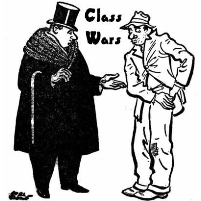Rich Americans Lengthened Lead over Others…and That was before Recession
Thursday, October 27, 2011

Affirming what other reports from academics have said, the past three decades witnessed the rich greatly expand their earnings and share of the nation’s income, while the middle-class and poor enjoyed far smaller gains.
The non-partisan Congressional Budget Office (CBO) found that the top 1% of Americans more than doubled their share of the nation’s income from 1979 to 2007 (from 8% to 17%), just before the Great Recession hit. This group’s average inflation-adjusted after-tax income grew by 275% during this period.
For those in the top 20%, their average real after-tax household income grew by 65%.
Comparatively, the growth rate for middle-income workers was 40%, and for the poorest fifth of the population, it was only 18%.
The richest 20% of Americans as a group earned more than the other 80% combined.
CBO analysts attributed the expanded enrichment of the wealthy to government policies that have been less concerned with redistributing wealth and allowed higher concentrations of income at the very top. For example, “the composition of federal revenues shifted away from progressive income taxes to less-progressive payroll taxes.” Wealthy Americans have also been able to shift their tax liabilities from income taxes to capital gains taxes, which are taxed at a lower rate.
The report also noted that federal entitlement programs, such as Social Security, are doing less to even out the distribution of income.
There were also factors unrelated to government policy, in particular the marked increase in executive compensation.
-Noel Brinkerhoff, David Wallechinsky
Top Earners Doubled Share of Nation’s Income, Study Finds (by Robert Pear, New York Times)
Summary: Trends in the Distribution of Household Income Between 1979 and 2007 (Congressional Budget Office) (pdf)
Trends in the Distribution of Household Income Between 1979 and 2007 (Congressional Budget Office) (pdf)
- Top Stories
- Unusual News
- Where is the Money Going?
- Controversies
- U.S. and the World
- Appointments and Resignations
- Latest News
- What If China Invaded the United States?
- Donald Trump Has a Mental Health Problem and It Has a Name
- Trump Goes on Renaming Frenzy
- Trump Deports JD Vance and His Wife
- Trump Offers to Return Alaska to Russia






Comments